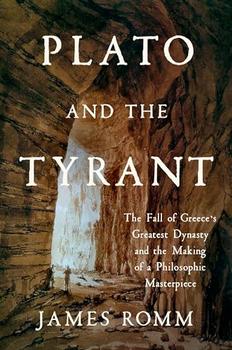
The Fall of Greece's Greatest Dynasty and the Making of a Philosophic Masterpiece
by James Romm
From an eminent historian and classicist, an incisive portrait of the philosopher Plato, showing how the ideas in his masterwork, Republic, were tested by violent events in the most powerful Greek city of the era.
Plato is one of history's most influential thinkers, the "sublime philosopher" whose writings remain foundational to Western culture. He is known for the brilliant dialogues in which he depicted his teacher, Socrates, discussing ethical truths with prominent citizens of Athens. Yet the image we have of Plato―an ethereal figure far removed from society and politics, who conjured abstract ideas in peaceful groves―is a fiction, created by Plato's admirers and built up over centuries. In fact, Plato was very much a man of the world.
In Plato and the Tyrant, acclaimed historian and classicist James Romm draws on personal letters of Plato―documents that have long been kept in obscurity―to show how a philosopher helped topple the leading Greek power of the era: the opulent city of Syracuse. There, Plato encountered two authoritarian rulers, a father and son both named Dionysius, and tried to steer them toward philosophy. At the same time, he worked on his masterpiece, Republic, in which he conceived a ruler who unites perfect wisdom with absolute power. That dream has echoed down through the ages and given rise to a famous term, one that Plato himself didn't actually use: philosopher-king.
As Romm reveals, Plato's time in Syracuse helped shape Republic―and also had disastrous results for Plato himself and for all of Greek Sicily. The younger Dionysius, emotionally unstable but intellectually curious, welcomed Plato with open arms, but soon the relationship soured. Plato's close friendship with Dionysius's uncle, Dion―possibly a bond of romantic love―created a rift in the ruling family that led to a chaotic civil war.
Combining thrilling political drama with explorations of Plato's most cherished ideas, Romm takes us into the heart of Greece's late classical age, a time when many believed that democracy had failed. Plato's search for solutions led him to write his fervent plea for a new political order, and also led him to a place where he believed his theories might be put into practice. But Plato and the Tyrant demonstrates how Plato's experiment with enlightened autocracy spiraled into catastrophe, and also gives us nothing less than a new account of the origins of Western political thought.
"A gripping, provocative, and deeply researched account of Plato's failed experiment in enlightened autocracy." —Kirkus Reviews
"James Romm has taken a little-known episode from ancient Greek history―the somewhat shady-sounding relationship between Plato and the tyrants of Syracuse―and developed it into a fascinating, richly detailed narrative. I may yet have to read the Republic." ―Mary Norris, New York Times bestselling author of Between You and Me and Greek to Me
"Written with sparkling wit and intelligence, this book will change the way you think about the ancient world's greatest philosopher." ―Robert Kagan, Senior Fellow at the Brookings Institution and author of Rebellion
"Plato's vision of a just society has inspired the world for centuries, yet his own attempt to put his ideas into practice ended in failure and disgrace. With this learned yet accessible account of the philosopher's misadventures in politics, James Romm asks a question that remains all too relevant today: Is it possible for thought to prevail over tyranny?" ―Adam Kirsch, author of The Revolt Against Humanity
This information about Plato and the Tyrant was first featured
in "The BookBrowse Review" - BookBrowse's membership magazine, and in our weekly "Publishing This Week" newsletter. Publication information is for the USA, and (unless stated otherwise) represents the first print edition. The reviews are necessarily limited to those that were available to us ahead of publication. If you are the publisher or author and feel that they do not properly reflect the range of media opinion now available, send us a message with the mainstream reviews that you would like to see added.
Any "Author Information" displayed below reflects the author's biography at the time this particular book was published.
James Romm is the James H. Ottaway Jr. Professor of Classics at Bard College and editor of the Ancient Lives biography series from Yale University Press. He is the author of several other studies of Greek and Roman history, and his reviews and essays appear regularly in the Wall Street Journal and the New York Review of Books.
Your guide toexceptional books
BookBrowse seeks out and recommends the best in contemporary fiction and nonfiction—books that not only engage and entertain but also deepen our understanding of ourselves and the world around us.